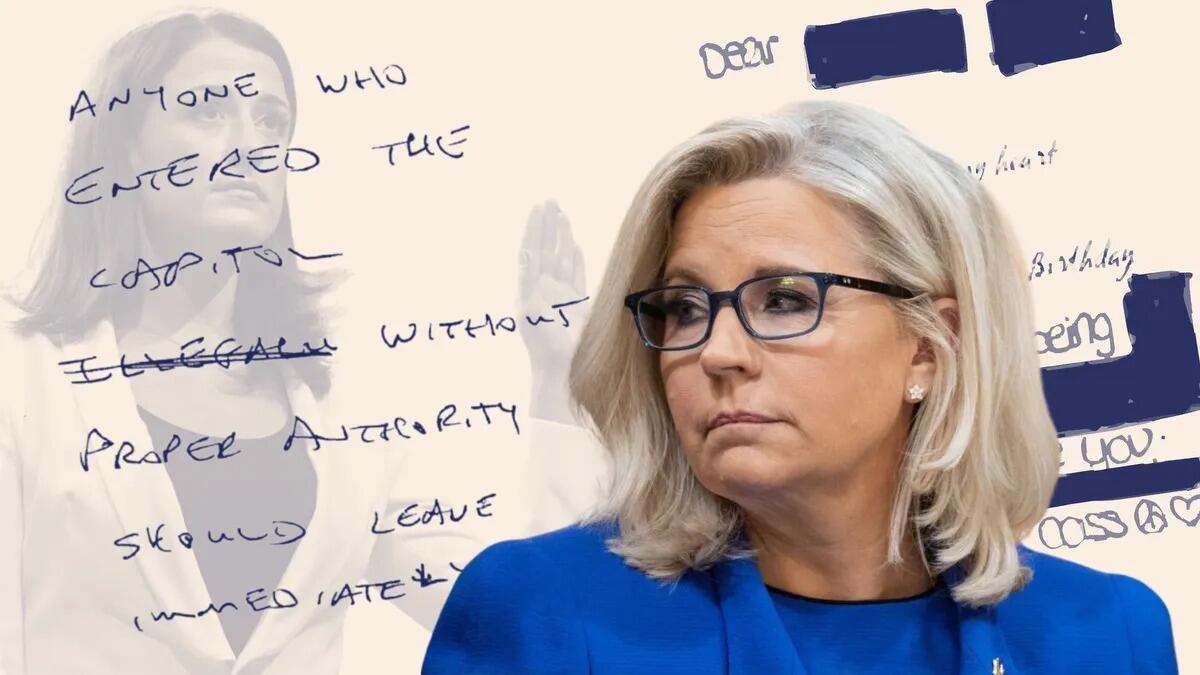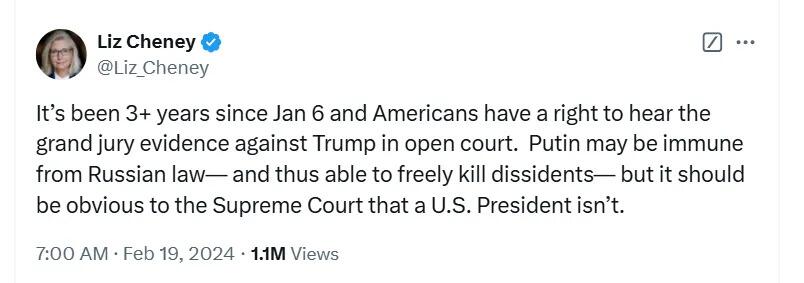Cheney's Pending Immunity Whiplash
Authored by Julie Kelly via Declassified with Julie Kelly (subscribe here),
Few people worked harder over the past few years to put Donald Trump behind bars than Liz Cheney, the former (alleged) Republican congresswoman from Wyoming.
Seeking revenge for Trump’s longtime criticism of her father’s “weapons of mass destruction” lie, Cheney sought to settle a family score by imprisoning Trump over the events of January 6. “No one is above the law!,” Cheney, in her grating sanctimonious style, frequently insists.
Well, except for her.
It now appears Cheney is preparing to fight any federal and/or congressional probe into her demonstrably corrupt role as vice chairman of the January 6 Select Committee. Text messages obtained by Representative Barry Loudermilk (R-Ga), chair of a House subcommittee looking into the J6 committee, prove that Cheney colluded behind the scenes with star witness Cassidy Hutchinson, who dramatically changed her testimony after connecting with Cheney. The communications could represent witness tampering, subornation of perjury—every former White House official including the driver of the presidential vehicle on January 6 has refuted Hutchinson’s account of Trump’s behavior that day—and obstruction.
Based on the results of his ongoing inquiry, Loudermilk determined that “numerous federal laws were likely broken by Liz Cheney” and called for the FBI to investigate her.
Cheney immediately responded by playing the victim and, of course, by blaming Donald Trump. But the American people appear uninterested in Cheney’s excuses; a new Rasmussen poll shows strong public support, including three-quarters of Republicans, for an FBI investigation into the bitter and defeated nepobaby.
If Trump’s Department of Justice decides to proceed, Cheney undoubtedly will seek immunity protections in an attempt to keep records away from federal investigators; members of Congress are entitled to immunity under the Speech or Debate Clause of the Constitution, which shields lawmakers from criminal liability related to their legislative duties.
Immunity for Me But Not For Thee or Thee or Thee
Cheney’s sycophants are already signaling that is the route she will take. During recent interviews, Rep. Jamie Raskin, a close pal of Cheney’s and fellow “NO ONE IS ABOVE THE LAW” squawker, warned the clause can prevent the FBI from accessing her communications.
Pressed by reporter Hugo Lowell during a recent podcast, Raskin pooh-poohed accusations that Cheney potentially broke the law. “That hardly is a crime in the United States,” Raskin said about Cheney’s secret collaboration with Hutchinson. “In any event, she’s completely protected by the Speech and (sic) Debate Clause, which protects all of us in our legislative capacities both in terms of our direct legislative action and in doing the investigative research that needs to be done in order to legislate and to act as legislators in a comprehensive way.”
Raskin said the same during a separate interview with CBS News. “They’ve been talking about going after Liz Cheney simply for doing her legislative work in a way that is completely covered by the Speech and (sic) Debate Clause. It is not a crime for someone to go out and find witnesses to a violent insurrection.”
Now, that is really rich coming from Raskin and potentially from Cheney. As members of the J6 committee, both were instrumental in stripping privilege sought by Trump and his inner circle including his attorneys, which resulted in the production of presidential records to the Trump-hating partisans on the committee and testimony by White House officials who are usually protected by executive privilege.
But Cheney also urged the Supreme Court to act quickly in denying Donald Trump’s claims of presidential immunity from prosecution after Special Counsel Jack Smith indicted Trump in August 2023 on four counts for his alleged role in “conspiring” to overturn the results of the 2020 election, representing the first time in history a former president faced a criminal federal indictment.
Despite the unprecedented nature of the question and troubling long term consequences for the country, Cheney acted as if the matter was a no brainer and accused anyone opposed as being, of course, a Kremlin stooge.
A few days before the court held oral arguments in Trump v US, the landmark immunity case, Cheney published an op-ed in the New York Times urging justices to move with haste. “If delay prevents this Trump case from being tried this year, the public may never hear critical and historic (sic) evidence developed before the grand jury, and our system may never hold the man most responsible for Jan. 6 to account,” Cheney wrote on April 22, 2024.
She further lamented how Trump tried to “delay” proceedings before her House committee by seeking privilege protections in court. “I know how Mr. Trump’s delay tactics work. Our committee had to spend months litigating his privilege claims…before we could gain access to White House records.” (This is untrue since Joe Biden repeatedly and quickly denied Trump’s privilege requests and Judge Tanya Chutkan, who later presided over Smith’s J6 indictment, also expedited the matter ultimately forcing the national archives to turn over presidential material that usually takes years to litigate.)
So, according to Cheney’s logic, any assertion of executive privilege—a legitimate legal argument with decades of recent case law behind it—represents a “delay tactic.” Should be fun to watch Cheney explain her hypocrisy once the privilege tables are turned.
Lawfare’s Karma Could Catch Up With Cheney
Further, the lawfare Cheney supported against Trump and his congressional allies could very well come back to bite her. A pair of recent court decisions have narrowed Speech or Debate Clause protections including those that appear tied to legislative functions.
The day after the Mar-a-Lago raid in August 2022, FBI agents seized the cell phone of Rep. Scott Perry, who was traveling with his family at the time. The FBI then sought court-approved access to thousands of records contained on his device as part of the DOJ’s investigation into Trump for Jan 6.
Perry invoked the Speech or Debate Clause in asking a D.C. judge to prevent the DOJ from obtaining roughly 2,000 messages and emails the Pennsylvania congressman said were related to official legislative business, namely, the certification of the 2020 election. But Beryl Howell, the former chief judge of the D.C. district court and unabashed Trump-hating partisan, denied almost all of Perry’s claims.
Judge Howell in January 2023:
Rep. Perry contends that he is entitled to withhold as privileged under the Clause 2,219 responsive records spanning his communications not only with fellow congressional Members and staff, but also with private individuals and officials with no formal role or function in the United States Congress, including officials with the Trump campaign, the White House, Office of the President, and the Pennsylvania State Legislature. He articulates a broad reach of the non-disclosure aspect of the Speech or Debate Clause privilege to block access in a criminal investigation to any communications he had with any person in any capacity when “he was engaged in information gathering that is ‘part of, in connection with, or in aide of a legitimate legislative act’ . . . even where it is an informal effort undertaken by an individual Member of Congress or their staff. This astonishing view of the scope of the legislative privilege would truly cloak Members of Congress with a powerful dual non-disclosure and immunity shield for virtually any of their activities that could be deemed information gathering about any matter which might engage legislative attention (emphasis added).
The D.C. appellate court in September 2023 largely upheld Howell’s order only making an exception to a handful of records pertaining to the votes planned for January 6, 2021. “Informal factfinding,” the three-judge panel including two Trump appointees concluded, “does not necessarily mean that such acts are privileged.” (Perry, by the way, was never charged.)
So, what “legislative” function did Cheney conduct when she used an encrypted app to talk to Hutchinson, who already had testified twice to the J6 committee before connecting with Cheney? Further, Hutchinson’s now provably false account of Trump’s behavior on January 6 had no role in developing legislation; in fact, the J6 committee’s final report contained only vague legislative recommendations that were never enacted by Congress. (Republicans took control of the House a few weeks after the committee issued its report.)
Cheney’s conduct also appears to fail the “investigative” test established in other court decisions. Hutchinson’s fictional tales about Trump physically confronting his security detail or throwing dishes at the wall or watching cable news as the chaos unfolded at the Capitol did not represent the fruits of an “investigation” or serve any investigative purpose.
Cheney may succeed where others failed since her immunity litigation will be handled by likeminded D.C. judges who won’t care about the appearance of hypocrisy. But watching Cheney—one of the most insufferable, self-aggrandizing, and thin-skinned politicians around—eat her own words will be a satisfying spectacle on its own.






No comments:
Post a Comment